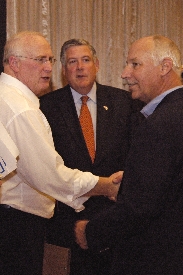Iowa Caucuses "Exciting Exercises in Democracy"
January 4, 2008

Rick Hardy (left) with Illinois Rep. Rich Myers (R-Colchester), right, and Illinois Senator Kirk Dillard (R-Hinsdale) during Western's mock presidential election. All three are Western Illinois graduates.
[Download Print-Quality Image]
MACOMB, IL - - The Jan. 3 Iowa caucuses which kicked off popular voting for the 2008 presidential race were "exciting exercises in democracy," according to Rick Hardy, professor and chair of Western Illinois University's political science department.
"The Iowa caucuses provided citizens rare opportunities to meet presidential hopefuls in person, to ask them questions and engage in meaningful dialogues with fellow citizens," Hardy said. "Equally important, it forced the candidates to fan out among the citizenry – at truck stops, churches, senior centers, factories, farms, wherever people gather – and listen to their concerns. In short, the caucuses fostered a unique consultation with the people."
Western's professor understands campaigning. Prior to coming to Western, Hardy was founder and director of the Institute for Leadership in Civic Education at the University of Missouri and was actively engaged in politics. He led several statewide reform drives, was a nominee for U.S. Congress in 1992 and represented Missouri in the 2004 Electoral College. Additionally, he has served as a political consultant for many organizations and major media outlets.
The fact that Democrat Barack Obama and Republican Mike Huckabee won their respective campaigns is a tribute to grassroots politics, according to Hardy.
"Prior to Iowa, both were underdogs, lacking establishment ties. By articulating clear visions that resonated with their respective constituents, both Obama and Huckabee were able to forge coalitions, energize their followers and capture significant pluralities," Hardy said. "Obama did especially well among young people and first-time caucus goers, and Huckabee was able to draw support from local church congregations.
"Iowa was well suited to this type of retail politics," Hardy added.
In Fall 2007, Hardy and John Hemingway, recreation, park and tourism associate professor, directed a five-night mock presidential election extravaganza at Western Illinois called "The Road to the White Starts at Western Illinois University." It was patterned after successful – yet smaller – simulations he and Hemingway organized at the University of Iowa in 1976, and another simulation Hardy conducted at the University of Missouri-Columbia (1988).
The mock election, which factored in a couple thousand students along with more than 100 faculty members from multiple disciplines, gave students a better understanding of the electoral process and hopefully will stimulate more student involvement in American politics as well, Hardy explained. As he tells the students, "You have to learn the rules if you're going to play the game."
"Exit surveys revealed that our WIU students gained a better understanding of the process by participating in the mock presidential election, and several students have called me to tell me they were working on various campaigns in Iowa as a result of their exposure in the mock election," Hardy said.
The constitutional law expert said many observers have criticized the great attention given to Iowa in the presidential selection process, but he believes the results in Iowa may be an important benchmark in American history.
"Barack Obama, an African American, demonstrated amply that he could attract the support of predominantly white constituents. Although the delegate selection process is just beginning, we may have just witnessed a turning point that may lead to the first African American president," Hardy said.
Illinois will be one of 22 states to hold presidential primaries and caucuses on Feb. 5, known as "Super Tuesday." On that day more than half of the delegates to the respective Democratic and Republican national conventions will be selected.
"Illinois is unlikely to see many Democratic presidential visits, because most of the field will likely cede the race to favorite son Barack Obama," Hardy said. "But for Republican presidential hopefuls, Illinois is up for grabs. Hence, it would be wise for the GOP candidates to make a few visits to the Land of Lincoln.
"We have to convince Republican candidates to branch out of Chicago and to come to central and western Illinois," said Hardy.
Hardy will serve as election night analyst on NBC affiliate WEEK TV News 25 in Peoria, with Congressman Ray LaHood, for Super Tuesday coverage (Feb. 5). To date he was the analyst for NBC affiliate WGEM TV in Quincy for the Jan. 3 Iowa caucuses; he was quoted in the Peoria Star Journal story "Illinois Voters Might Not be Influences by Outcome" (Jan. 3); and he was quoted in the Fox Business Network (foxbusiness.com) story "Election 2008: Iowa and the Bigger Picture" (Jan. 4).
Posted By: University Communications (U-Communications@wiu.edu)
Office of University Communications & Marketing

Connect with us: